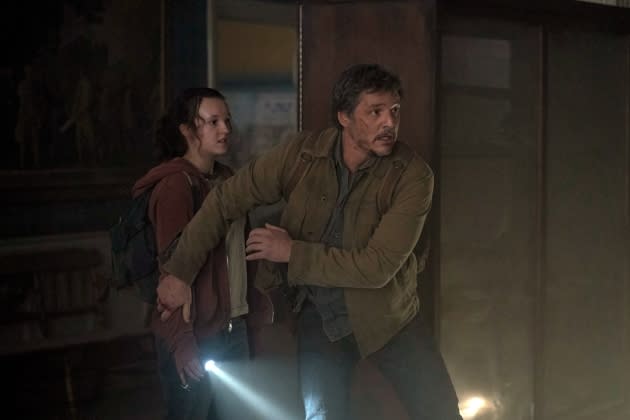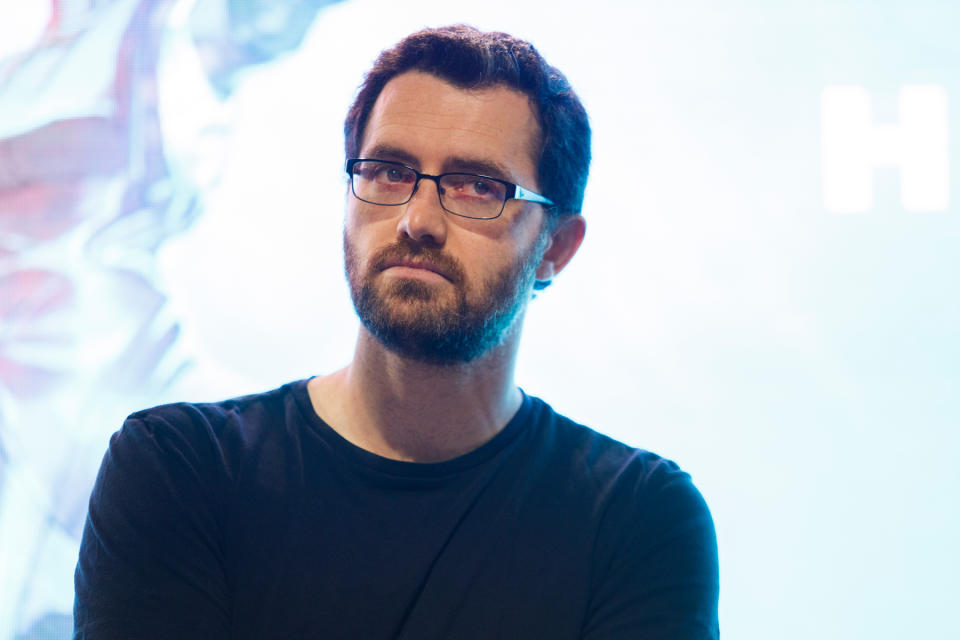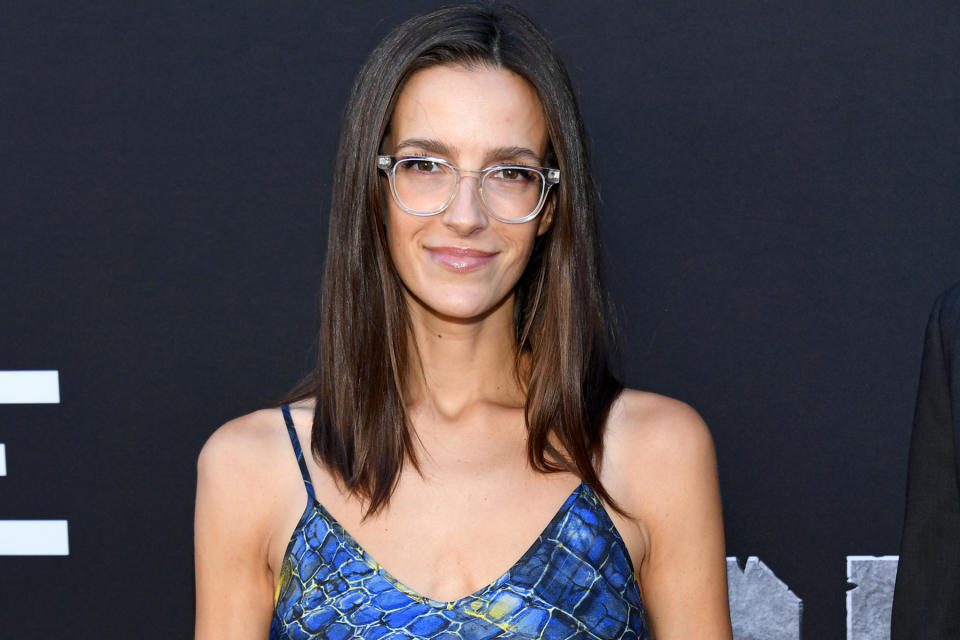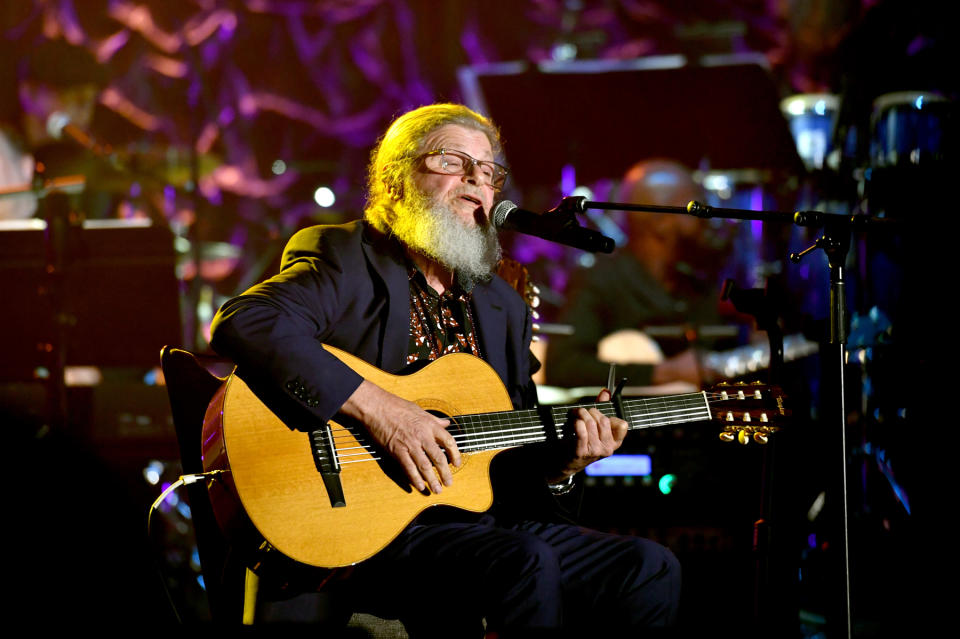Beyond ‘The Last of Us’: Three Video Game Maestros Reveal Their Secrets
- Oops!Something went wrong.Please try again later.
- Oops!Something went wrong.Please try again later.
- Oops!Something went wrong.Please try again later.

Game music isn’t just for gaming nerds anymore. It’s finally being recognized as real, “serious” music. This year, the Grammys introduced a new category for video game music: Best Score Soundtrack for Video Games and Other Interactive Media. The music has evolved along with the video game artform, as scores increasingly lay the emotional groundwork for an immersive experience.
What’s notable about numerous modern game soundtracks is their cinematic scope, involving lush orchestrations, heavy percussions, kinetic solos, propulsive vocals, and eurythmic atmosphere. Just like people become emotionally invested in the music of films, gamers and music lovers are becoming devoted fans of sweeping video games scores.
More from Rolling Stone
David Byrne, Stephanie Hsu, and Son Lux to Perform at 2023 Oscars
'The Last of Us' Soundtrack Delivers Complete Score From Season One
'Perry Mason' Finds Its Mojo in Season 2 by Getting Down and Dirty
A score contains several sections and can be a solo piece or orchestral composition. There are three music composers who shine bright in the film, television, and game arenas: Austin Wintory, Sarah Schachner, and Gustavo Santaolalla. This ensemble creates some of the most incredibly moving music in the game field, crafting emotional soundscapes that win over listeners. Because gamers establish a longer relationship with stories and characters than film-watchers, the music for games has to be layered and contiguous to the user’s experience.
Wintory is the composer behind games like Flow, Journey, and Command and Conquer: Rivals, as well as dozens of films and TV series including Netflix’s recent miniseries Thai Cave Rescue. His score for Journey made history as the only game soundtrack to be nominated for the Grammy Award for Best Score Soundtrack for Visual Media. He was nominated for a Grammy this year for his score to Aliens: Fireteam Elite. Schachner created the scores to hit games like Anthem, Call of Duty: Modern Warfare, Assassin’s Creed Valhalla, and Call of Duty: Modern Warfare II, as well as films like the recent Predator prequel Prey. Last but certainly not least, Argentine composer Santaolalla won Academy Awards for the scores to Brokeback Mountain and Babel before crafting the scores for the games The Last of Us and The Last of Us Part II, as well as their hit HBO adaptation The Last of Us.
Video games have grown into a multi-billion-dollar business, and the advancement of their technology reflects that. Immersive concerts like those in Fortnite are a perfect example of how the game industry is technologically evolving and catering to more advanced needs.
Austin, Sarah, and Gustavo recently spoke with Rolling Stone about what unites film and game music.
Austin Wintory

I got some career traction with films playing at Sundance and modest theatricals with independent films. But I was able to start games and films simultaneously. My first opportunity was off the backs of student projects about seventeen years ago when I was at USC. There was a student going to AFI who was looking for a composer for his thesis film. While I was writing the music, he went off to Jordan, where he was born, and filmed his feature, Captain Abu Raed. That ended up winning Sundance and playing a million other festivals. It also got some Oscar buzz. It was a leap forward for my career filmwise. Parallel to that was a similar story. I met a student who was getting his master’s degree in video game design. This was almost twenty years ago and that kind of degree was brand new. He showed me a game he was working on, Flow, which was his master’s thesis. It exploded online. Sony approached him about remaking it into a PlayStation game. I was swept up into the momentum of that and got to work on a PlayStation game that came out a month before I graduated. Both projects were instrumental in helping me get my feet on the ground as a composer.
On how he finds the “emotional implications” in projects:
There are three things that meld together in ways I don’t understand. Number one is intuition. I’ve been doing this so long that my instincts lean toward certain ideas. I tentatively trust those. Second, I just live life… read books, see plays and movies, and meet people. You invariably discover things that will go into your mental toolkit and inspire you by doing these things. Third, and probably most important, is trial and error!
On describing his sound:
I do have a bit of an old-school streak in so far as melody is something important to me. If I’m writing something that’s amorphous or ambient, I try to give it some subtle sense of shape and I usually don’t stick in that for long before I’m craving something more melodic. I also really love to experiment with the kinds of sounds that I put together. I like to find things that feel like combinations of colors that I’ve never tried. If I’ve done my job correctly, I don’t have an ultra-consistent sound. I think I do things below the level of the sound that start to sound like me, though. Musical ingredients, sometimes subtle, that start to aggregate into being my signature.
On choosing instruments:
I take the general approach of capturing emotions. It’s what will make me feel a certain way. I’m working on a video game musical with Summerfall Studios called Stray Gods where the songs are being controlled by the player. It’s the most ambitious thing I’ve ever attempted. The sheer scope of the amount of music that had to be created for this pile of possibilities for the player to navigate is astonishing. We did the math and there’s something like nine million possibilities for the player. It’ll be released this year sometime. There’s a character whose nature made me want to use the guitalele that has the perfect amount of body to the sound. It’s a meatier sound than a ukulele. You can also play slightly more elaborate material on it because of the advantages of the guitar construction. The sound is a little unusual and carefree, like the character. Also, sometimes as a challenge I’ll use an instrument wildly against its typical casting. Can I build an action score around a harp? Can I do an emotional, vulnerable piece with a harmonica?
Sarah Schachner

For me, it wasn’t so much college that shaped my music interests but how I grew up. My family is super musical and I can’t remember a time before playing instruments. We performed in a band together and I was lucky enough to have a couple of great music teachers early on. I could never have known at the time where it was leading me, but having a broad exposure to all kinds of music and the experience of playing in bands and orchestras has had the biggest impact on how I approach music today.
On the evolution of her sound:
I had worked behind the scenes contributing music to a ton of games before I ever got the chance to score one on my own. I was hired for Call of Duty: Infinite Warfare and Assassin’s Creed Origins in the same week. I was elated and then, predictably, overwhelmed with sheer panic. It was a crazy experience to get through both of those at once at that early point in my career, but I felt like I got ten years of learning condensed into one.
I learned how to produce music by playing every instrument myself one at a time, recording in layers, and blending with synths by ear. I remember trying very hard to make it sound like I had a huge budget and had recorded with live players. What I initially viewed as a frustrating limitation has become my process and sound that I’ve fully leaned into. I love to collaborate with other musicians now, usually in very small groups. There is this exciting, intangible energy when you find people you click with artistically and make a bunch of sounds in a room together.
On the Prey soundtrack:
After I read the script, I read whatever I could about the Comanche culture. It’s a fascinating history so it was all marinating in my head for a while. In my early conversations with [director] Dan Trachtenberg, it was clear they were putting a lot of effort into accurately representing the culture, but the film’s sci-fi genre-mashing gave a lot of musical freedom. I’m thrilled I was able to collaborate with Robert Mirabal, a Pueblo musician from Taos, New Mexico. He invents his own unique wind instruments that perfectly meshed with the tapestry of the score.
On her favorite instrument:
I love the combination of analog warmth and acoustic imperfection, so I collect a lot of unusual string instruments and synthesizers. The LinnStrument [by Roger Linn] has become a staple for me. It’s a unique expressive tool to play synths in a very different way from a traditional keyboard. Making sound is a physical process and I like it to be a tactile experience. It’s very fun banging on things and making noise out of whatever random objects are laying around.
Gustavo Santaolalla

I really don’t find that much of a difference because the way I work on a film is not the usual way a composer does. I come from a different avenue. It’s not that I’m a film composer. I’m an artist. I started making records at a young age and I still do. I play solo concerts. I produce a lot of alternative Latin acts. I’m very lucky to be recognized with lots of Latin Grammys and Grammys. I do many things, and film is one. With video games, it should be “game” because I’ve only worked on one.
In general, the way I like to work is to be inspired by the story and the characters. When I work on film, I don’t work to picture. I do a lot of music and obviously the music gets adapted to the different scenes. But the different themes, the gestalt of the music, the sonic fabric, and the instruments, are determined prior. That’s why I like to work on films early, if possible. For example, I wrote that whole score for Brokeback Mountain before one frame was shot. When I saw the first cut, it was spooky. Ang Lee told the LA Times that he used the music to create the narrative. There’s a lot of music I’ve done where I haven’t seen any of the films yet. That also holds true for video games. You may see some drawings of the characters, but musically you’re primarily working off of the basis of the story and the characters. So, for me, it wasn’t a big change.
On getting involved with The Last of Us game and HBO series:
After I won the two Oscars, I got approached by several companies. I’ve always been extremely picky with the stuff that I do. Some of these companies were big companies but I knew what I wanted. When I met Neil [Druckmann, the game’s creator] and he told me The Last of Us story, he reminded me of [Alejandro González] Iñárritu. We could connect in that language.
Of course, I always like to read the script, then have the director tell me a story because you have to help express the vision of the director. With Brokeback Mountain, I read the script, I met Ang Lee once, and we talked a little bit about the idea of the music. Then I sent the music a month after. James Schamus, the producer from Focus, told me Ang thought I was sending samples of work I’d done. He was surprised that it was the complete score.
With The Last of Us, I gave batches of music through a period of three years that the game was being developed. Some of the music inspired Neil’s writing. It was nice to collaborate on that level. Then came the challenge of the second game. You want to connect just as strongly with the audience the second time around. I introduced the idea of the banjo and Neil and everyone were very open to it.
On his approach to composing:
I take an emotional approach to composing, with logic behind it. For example, with Babel, I wanted to find an instrument that could be the MC of a particular scene. I wanted it to have a world music vibe, but I didn’t want it to sound like a National Geographic documentary. So I found the oud, which is an ancestor of the lute. That connected me with the Arab world and with the Mexican guitar. Because I played with my fingers, I found I could make sounds that connected with Japanese koto. It got me my second Oscar, but I had never played it and I’ve never played it again. I wasn’t using it as an oud player but almost like a painter. It allowed me to do very minimalistic things. Very small melodies. For many years, I’ve used PVC pipes to create unique sounds. I also use cans and found items that I can make sounds with. I’m looking for the soul of the object.
Best of Rolling Stone

